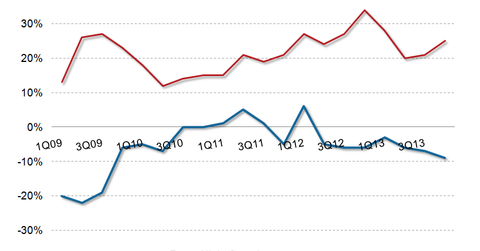Expedia rolls out ETP program to compete with agency model peers
During 2012, Expedia introduced the Expedia Traveler Preference (ETP) program in the U.S. that offers travelers the choice to either pay Expedia at the time of booking or pay the hotel at the time of stay.
Nov. 20 2020, Updated 2:01 p.m. ET

The merchant model and the agency model
Expedia follows two business models—the merchant model and the agency model—using these, it facilitates the booking of hotel rooms, airline seats, car rentals, and destination services from its travel suppliers. Expedia is the merchant of record in the merchant model, while the travel supplier is the merchant of record under the agency model.
The online travel industry has seen the development of alternative business models and variations in the timing of payment by travelers and to suppliers, which in some cases, has placed pressure on historical business models. The agency hotel model is popular in Europe due to the fragmented nature of the hotel industry and has boosted the business of peer Priceline’s (PCLN) brand, Booking.com. The widespread adoption of the agency model in Europe had prompted Expedia’s acquisition of Venere.com in 2008. Expedia then launched Expedia Easy Manage program, a commission-based partnership option for qualifying hotels in the Europe, Middle East, and Africa region (EMEA).
During 2012, Expedia introduced the Expedia Traveler Preference (ETP) program in the U.S. that offers travelers the choice to either pay Expedia at the time of booking or pay the hotel at the time of stay. News reports speculated that Expedia launched the ETP program due to competitive concerns. Priceline has been aggressively marketing Booking.com in the U.S., where Expedia is currently the market leader with a 43% share.
Priceline’s advertising campaigns for Express Deals and Booking.com has led to market share gains from Expedia and its “opaque” deals site, Hotwire. Orbitz Worldwide (OWW) too has a merchant model and an agency or a retail model. Internet media company Travelzoo (TZOO) launched the first phase of its hotel booking platform at the end of last month. In 2012, Travelzoo bought the hotel booking portal, Perfect Escapes as a move toward building its hotel booking platform.
The ETP program will enable a much closer integration of Expedia’s agency hotel product with the core merchant offering. CEO Dara Khosrowshahi said in 2012 on the roll out of ETP, “If and when rolled out on a broad basis, (the ETP program) would be likely to drive back the growth in our agency hotel business, which could result in blended hotel margins as well as our merchant hotel flow trending down over time.”
The management said on the recent fourth quarter 2013 earnings call that ETP is rolled out across just about 45,000 hotels. Earlier converts to ETP included hotel chains such as Hilton Worldwide, Accor, and Marriott International. The management added, “Suppliers who have adopted ETP continue to see an improvement in room night growth of as much as 10 percentage points or more compared to the period just before they went live.”
Expedia sees higher level of net revenue per transaction under the merchant model as commissions are comparatively lower in an agency model. Also, Expedia noted in its filing that as part of the introduction of ETP, it reduced negotiated economics in certain instances to compensate for hotel supply partners absorbing expenses such as credit card fees and customer service costs. So, the global rollout of ETP has negatively impacted the margin of revenue the company earned per booking. It said it expects revenue per room night to remain under pressure in the future.
Expedia said one of the reasons it saw a 7% decrease year-over-year in 2013 in revenue per room night was due to efforts to expand inventory availability as well as its global supply portfolio, including contracts signed as part of the ETP program. However, room night growth increased 23% in 2013, and that could help offset this decline in the revenue going forward. The management noted on the earnings call that ETP drives both merchant and agency room nights, and excluding eLong (LONG), agency room nights represented over 15% of Expedia’s global room nights in the fourth quarter of 2013 and grew in excess of 100% year-over-year.
